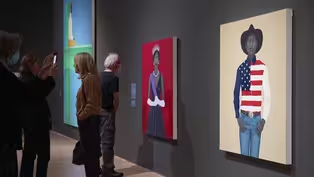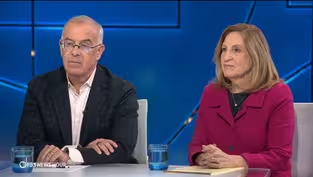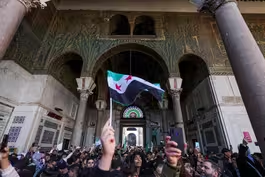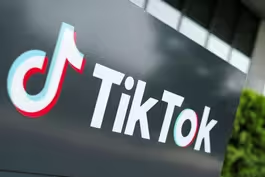
Former ambassador outlines future role of Syria's neighbors
Clip: 12/13/2024 | 7m 29sVideo has Closed Captions
Former ambassador outlines role Syria's neighbors could play in its future
Turkey announced it would reopen its embassy in Damascus after closing it 12 years ago as Bashar al-Assad began the murderous campaign against his own people. Turkey and Syria's other neighbors could play a critical role in rebuilding the country. Amna Nawaz discussed more with Ambassador James Jeffrey. He served during the Trump administration as a special representative for Syria engagement.
Problems playing video? | Closed Captioning Feedback
Problems playing video? | Closed Captioning Feedback
Major corporate funding for the PBS News Hour is provided by BDO, BNSF, Consumer Cellular, American Cruise Lines, and Raymond James. Funding for the PBS NewsHour Weekend is provided by...

Former ambassador outlines future role of Syria's neighbors
Clip: 12/13/2024 | 7m 29sVideo has Closed Captions
Turkey announced it would reopen its embassy in Damascus after closing it 12 years ago as Bashar al-Assad began the murderous campaign against his own people. Turkey and Syria's other neighbors could play a critical role in rebuilding the country. Amna Nawaz discussed more with Ambassador James Jeffrey. He served during the Trump administration as a special representative for Syria engagement.
Problems playing video? | Closed Captioning Feedback
How to Watch PBS News Hour
PBS News Hour is available to stream on pbs.org and the free PBS App, available on iPhone, Apple TV, Android TV, Android smartphones, Amazon Fire TV, Amazon Fire Tablet, Roku, Samsung Smart TV, and Vizio.
Providing Support for PBS.org
Learn Moreabout PBS online sponsorshipAMNA NAWAZ: The fall of Bashar al-Assad is rippling throughout the Middle East.
Turkey announced today that it would reopen its embassy in Syria's capital, Damascus, tomorrow after closing it 12 years ago.
And Secretary of State Antony Blinken has been traveling in the region.
He visited Jordan and Turkey yesterday and stopped in Baghdad today.
And he reiterated what the U.S. hopes to see in Syria.
ANTONY BLINKEN, U.S. Secretary of State: In all of this, what's happening in Syria does have an important impact, and it's very significant that Iraq, along with many other countries in the region and beyond, will make best efforts to support the Syrian people as they emerge from the Assad years.
AMNA NAWAZ: For perspective on how the shifting situation in Syria impacts the greater Middle East, we turn to Ambassador James Jeffrey.
He previously served as U.S. ambassador to Turkey and Iraq and was a special representative for Syria engagement during the Trump administration.
He's now at the Wilson Center, a Washington, D.C., think tank.
Good to see you.
JAMES JEFFREY, Former U.S.
Ambassador to Turkey: Thanks for having me on.
AMNA NAWAZ: So the end of the Assad regime is not only about how Syria is reshaped, but the region more broadly as well.
Let's just start with some of Syria's neighbors, and Turkey specifically.
They actually helped those Sunni rebels who overthrew the Assad regime to do so.
So what does the end of the Assad regime mean for Turkey?
JAMES JEFFREY: What it means for Turkey, just like for the people of Syria, as we saw in Leila's report, and for everybody else around Syria, is a very good thing compared to the awful situation we had in the region and particularly in Syria before.
For Turkey, it shares with everybody else the desire to have the Islamic State elements still in Syria destroyed, to keep Iran that is now out, out for the long term, to diminish, to the extent possible, Russia's remaining influence.
But Turkey also wants, as we heard, to get the three-plus million Syrian refugees back once things stabilize.
It also wants -- and this is a complication with us -- to ensure that the PKK offshoot that is our ally against the Islamic State... AMNA NAWAZ: This is part of the Kurdish minority in the northeast.
JAMES JEFFREY: Right.
They don't want that group to form a state within a state beholden to the PKK and thus a threat to Turkey.
Beyond that, it's basically to secure their southern border.
AMNA NAWAZ: When it comes to the PKK and it comes to this Kurdish minority, as you mentioned, that is America's closest ally in Syria, was helping them and helped them to fight ISIS in the region, what's going to happen with the U.S. policy towards them now?
Will they be abandoned by the U.S.?
JAMES JEFFREY: I don't think they will be abandoned.
Jake Sullivan, the national security adviser, in Jerusalem today made it clear when this came up that we have a deep, and he used the word resolute, position on continuing to work with them, as long as, A, there is no effective central government and army in Syria, and, B, we need to fight against the Islamic State.
Beyond that, we never signed up -- and I was the guy delivering the message to the Kurds.
We never signed up for a Kurdish state beholden to the PKK in Northeast Syria.
They would have to work this out with the rest of Syria and with Turkey on their own.
We, however, will help them.
That's very clear.
AMNA NAWAZ: It is notable that Secretary Blinken made a surprise visit to Iraq as part of his Syrian diplomacy effort.
He met with the Iraqi prime minister, Mohammed Shia' Al Sudani.
He stressed that Syria should not become what he called a platform for terrorism.
Is there a model for Syria's future when you look at Iraq?
JAMES JEFFREY: There is.
First of all, technically, there's a U.N.
Resolution 2254 that Kerry negotiated with Russian Foreign Minister Lavrov in 2015.
It lays out exactly what Tony Blinken is saying, a hopefully democratic, inclusive, reconciled Syria with a new constitution that can live in peace.
Ironically, Iraq has largely achieved that through the efforts of their own people and help from us.
The problem is -- and this is where Iraq is so interesting right now -- Iraq is under pressure from Iran as part of its regional proxy network.
But now, with Syria no longer being on Iran's side, Iraq now has new options, and it will be very interesting to see how we work with the Iraqis and how the Iraqis react to this.
AMNA NAWAZ: Well, what about Iran?
If it's fair to say that Turkey has emerged as the big winner from this shakeup post-Assad in Syria, is it also fair to say that Iran is the big loser here?
They have been pouring money and military aid into Syria to back Assad for years.
How do you look at Iran now?
JAMES JEFFREY: I look at Iran as the loser in one of the biggest military revolutions in the Middle East in my lifetime, comparable to 1973 Yom Kippur War and the liberation of Kuwait in 1991.
It has not only lost in Syria.
It has lost in Gaza.
It has lost in Lebanon with the near destruction of Hezbollah and now a cease-fire, and it lost in its missile and air war with Israel dramatically.
Its only ally left that's still standing is the Houthis.
AMNA NAWAZ: You mentioned, obviously, Iran's weaknesses here revealed and their proxies that were fighting Israel through Hamas and through Hezbollah, the Houthis in the Red Sea.
What does all this mean for Israel in the region?
JAMES JEFFREY: Well, it means that Israel is in an extraordinarily secure place.
I think the first indication of that will be a rapid movement, if Hamas or what's left of Hamas will play along, on the hostages for a cease-fire, which we all need in Gaza, because Israel doesn't have to deal brutally anymore with Gaza, because it has five other wolves chasing its sled.
They're all dead or gone.
AMNA NAWAZ: All of this is going to be inherited by the incoming Trump administration in just a matter of weeks.
And I want to put to you something the president-elect tweeted just six days ago.
He wrote: "Syria is a mess, but it is not our friend.
And the United States should have nothing to do with it.
This is not our fight.
Let it play out.
Do not get involved."
You served in the Trump administration.
How do you take that message?
What does that mean?
JAMES JEFFREY: Well, first, I can't speak for the administration, and I'm hesitant to predict what Donald Trump, like most of us are hesitant, what he will do.
But I will say this.
That's not very different from his position when I was working with Secretary Pompeo on the Syria account and I would argue very productively.
I interpret that to be, first of all, we're going to stay out of it in the sense of not doing another Afghanistan, not do another Iraq, trillions of dollars of money spent, tens of thousands of casualties, hundreds of thousands of people.
AMNA NAWAZ: Not putting boots on the ground.
JAMES JEFFREY: Exactly, massive boots on the ground, because we have boots on the ground.
He twice decided we shouldn't be in Syria with the 900 troops we have, but he was persuaded by his advisers, no, in a transactional way, our costs are low and our interests are significant.
He kept those troops on.
The fact that those troops were there and the other policies from the Trump administration continued sometimes unenthusiastically by the Biden administration has helped produce the Syria and the collapse of Assad we're seeing today.
AMNA NAWAZ: Ambassador James Jeffrey, thank you so much for your time.
Always good to hear from you and your insights.
Thanks for being here.
JAMES JEFFREY: Thank you.
Amy Sherald on the gaze and humanity of her portraits
Video has Closed Captions
Clip: 12/13/2024 | 6m 48s | Amy Sherald on the gaze and humanity of her portraits (6m 48s)
Brooks and Marcus on what's next for the FBI under Trump
Video has Closed Captions
Clip: 12/13/2024 | 10m 58s | Brooks and Marcus on Wray's resignation and what's next for the FBI (10m 58s)
Murder reveals simmering anger with U.S. health care system
Video has Closed Captions
Clip: 12/13/2024 | 6m 47s | CEO murder reveals simmering anger with American health care system (6m 47s)
Syrians jubilant in first Friday prayers after Assad
Video has Closed Captions
Clip: 12/13/2024 | 5m 36s | Syrians express jubilation during first Friday prayers since overthrow of Assad (5m 36s)
Why an investor thinks TikTok will be safer with U.S. owners
Video has Closed Captions
Clip: 12/13/2024 | 6m 42s | Investor explains why he thinks TikTok will be safer with U.S. ownership (6m 42s)
Providing Support for PBS.org
Learn Moreabout PBS online sponsorship
- News and Public Affairs

FRONTLINE is investigative journalism that questions, explains and changes our world.

- News and Public Affairs

Amanpour and Company features conversations with leaders and decision makers.












Support for PBS provided by:
Major corporate funding for the PBS News Hour is provided by BDO, BNSF, Consumer Cellular, American Cruise Lines, and Raymond James. Funding for the PBS NewsHour Weekend is provided by...




